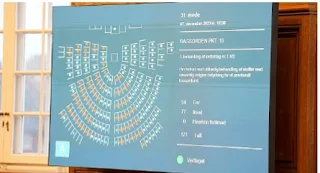Peru’s Ex-President Fujimori, 85, Freed After Pardon Reinstated
Fujimori was sent to prison in 2009 over massacres committed by army death squads in 1991 and 1992 in which 25 people, including a child, were killed in supposed anti-terrorist operations.
Former Peruvian president Alberto Fujimori, 85, was freed from prison on Wednesday after a court reinstated a pardon of his 25-year sentence for crimes against humanity.
Fujimori, who served from 1990 to 2000 and is now in poor health, left the Barbadillo prison in Lima and was greeted by his children Keiko, a three time failed presidential hopeful, and Kenji, a businessman. The elder Fujimori wore nasal tubes providing him with oxygen from a tank.
They all drove away in a gray truck that moved slowly through a crowd of cheering supporters.
“Our heart is bursting with joy, because this man was imprisoned unfairly,” said one supporter who gave her name only as Nikita.
Keiko Fujumori said her father’s condition is fragile. “The most important thing is to take care of him and that he recover little by little,” she told reporters outside her home.
She added: “We know that the best therapy is the love of his family.”
Fujimori was sent to prison in 2009 over massacres committed by army death squads in 1991 and 1992 in which 25 people, including a child, were killed in supposed anti-terrorist operations.
On Tuesday, the Constitutional Court ordered him freed for humanitarian reasons, reinstating a pardon that was first granted in 2017 but revoked by the Supreme Court two years later.
Fujimori, who is of Japanese heritage, has divided Peruvians like few other ex-leaders.
For some, he bolstered economic growth through his neo-liberal economic policies, and deserves praise for crushing left-wing insurgencies, including the Shining Path rebels.
Others remember with loathing his ruthless, authoritarian government style.
Earlier on Wednesday, the Costa Rica-based Inter-American Court of Human Rights urged authorities not to immediately free him, seeking time to assess the Peruvian court ruling.
Peru’s Constitutional Court had ordered Fujimori to be released last year on humanitarian grounds, but the Inter-American court then also urged against the move, which the government in Lima heeded.
This time the government ignored the Inter-American court and freed the aging ex-president.
The Constitutional Court reasoned that beside humanitarian reasons for freeing him, Fujimori had served about two-thirds of his sentence.
Fujimori was impeached in November 2000 on grounds of “moral incapacity” and was also accused of corruption.
The previous day he had fled to Japan, the homeland of his parents, and resigned by fax. He later went to Chile, from where he was extradited in 2007.
These days he suffers recurrent respiratory, neurological and hypertension problems and has had tongue cancer.
The ruling Tuesday to reinstate the pardon cannot be appealed.
In other legal woes, Fujimori has pleaded guilty to bribing lawmakers and spying on rivals while in power.
He was also investigated over the forced sterilization of hundreds of thousands of poor, mostly Indigenous women during his final four years in power.
An estimated 270,000 Peruvians, many of them Indigenous people who did not speak Spanish, underwent surgery to have their fallopian tubes tied as part of a family planning program implemented under Fujimori.
In 2021, a judge ruled that Fujimori could not, at the time, be prosecuted in the case for technical legal reasons.
Keiko Fujimori said last year she would pardon her father if elected, but she was defeated by leftist Pedro Castillo — who was later ousted and jailed at the same prison as the elder Fujimori.










